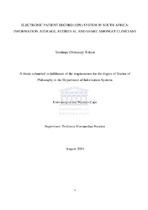Electronic patient record (EPR) system in South Africa : information, storage, retrieval and share amongst clinicians
Abstract
A phenomenological philosophy underlies this research study which attempts to understand clinicians’ perception and understanding of an electronic patient record (EPR) system currently operational at a hospital in the Western Cape Province in South Africa (SA). Healthcare is a human right, thus patient records contain critical data and mostly paper-based in many SA hospitals. Clinicians are the EPR primary users and their attitude in its use is important for its success. This study explores, identifies and determines clinicians’ cognitive attributes towards EPR with a technology use framework developed. An initial quantitative approach was applied but unsuccessful due to low sample size. A pilot study was then conducted using 11 respondents. Purposive sampling was first initiated then snowball introduced later to improve the sample size qualitatively. Interviews were administered to 15 clinicians and tape recorded. Narrative content analysis was used as the preferred analysis technique because of the advantage of gaining direct information from study participants, unobtrusive and a nonreactive way to study the phenomenon of interest. Research findings tested 12 propositions and found high impact relationships between attitude (ATT) and each listed theme namely: perceived usefulness (PU), perceived ease of use (PEOU), complexity (COM), facilitating condition (FC), use behaviour (USE). Use behaviour had high impact relationships with storage (STO) and retrieval (RET). There were moderate impact relationships between PU and USE; PEOU and PU; RA and ATT; job fit (JF) and ATT; USE and share (SHA). The implication here is that any EPR system to be implemented should be tested using this framework to ascertain its usefulness and fit with a hospital's objectives and users expectations. By so doing, anticipated problems can be mitigated against and resolved before implementation. The study contributes to the information system (IS) body of knowledge through the technology use framework. The framework is for adoption by hospital management and its use by clinicians where EPR is operational. Traditional IS frameworks can be adopted for hospitals about to implement EPR because of the relevance of the "intent to use" theme.

